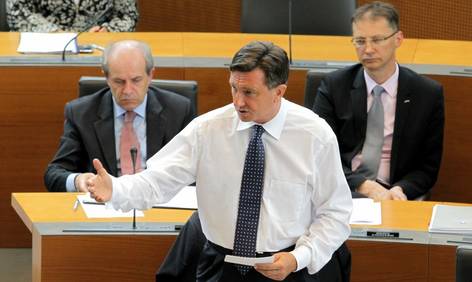NEWS
Prime Minister Pahor fields questions from parliamentary deputies
At the 30th regular session of the National Assembly held today, the Prime Minister of Slovenia, Borut Pahor, answered questions posed by opposition MP Zmago Jelinčič from the Slovene National Party (SNS) and by a coalition MP, Bogo Sajovic (LDS).
MP Jelinčič asked Prime Minister Pahor about the meaning of the provisions contained in the arbitration agreement and about the interstate border. Prime Minister Borut Pahor replied that the Agreement allowed for the possibility for the signatories to decide to resolve any issues without the need for a tribunal. If the signatories agree to resolve one or more of the dispute's issues bilaterally, they may attempt to do so, and insofar as they complete this successfully, the tribunal shall be obliged to respect this in accordance with the Agreement. Prime Minister Pahor went on to say that the only role of the European Commission, the Council of Europe, the European Parliament — or any other authority of the European Union — is to nominate candidates for arbitrators; apart from this, it shall play no other role in the context of the Arbitration Agreement. 'The border issue with Croatia has been resolved and it has brought us a true friend in the east and a good neighbour, and this is an investment in something which will pay dividends in resolving any other issues,' added Prime Minister Pahor and denied the statements made by MP Jelinčič that everything apart from what the public knows about the Arbitration Agreement had been agreed in advance. He stressed that the majority of National Assembly members and the majority of voters in last summer’s referendum had decided that this was an appropriate solution for the determination of one of the most important issues with regard to our sovereignty. By resolving issues in such a manner, Slovenia considerably strengthened its reputation, which is a significant category in international politics, and this Agreement is considered to be a reference agreement at the outset of this century in Europe.
MP Sajovic posed a question concerning the capital adequacy of Nova Ljubljanska banka, a state-owned institution whose capital is required to be appropriately increased following the instructions of the Bank of Slovenia. In respect thereof he asked the Prime Minister about his attitude towards this capital increase and whether he was in favour of or against the capital increase from public funds.
In his reply, Prime Minister Pahor stressed that the Bank of Slovenia, in much the same way as the central banks of other European states, gave a clear message that the business banks in their environments must be careful about their levels of capital adequacy, and the same applies to NLB in Slovenia. When handing over the sectoral policy for the financial industry to the Capital Investments Management Agency, the Government of Slovenia decided to impose on the Agency the preparation of the programme in such a way so as to begin with the instrument of private domestic or foreign investor in the second capital increase of Nova Ljubljanska banka, which is now almost certain. If this should fail, the Slovenian Government will decide on how best to ensure the capital adequacy of Nova Ljubljanska banka so as to protect its interests as well as the interests of all citizens. As an accountable owner of the majority share in this bank concerning any capital increase, the Slovenian Government agreed that if the talks with the present strategic partner, KBC, did not go as desired, it would begin to examine the possibility of a new, third strategic investor, i.e. a private domestic or foreign investor so as to ensure that the bank has an appropriate business environment in order for it to grow into a respectable regional banking institution. Prime Minister Pahor concluded by repeating his opinion that it was more important to have a good quality bank which is partly foreign owned than to have a substandard domestic bank.




